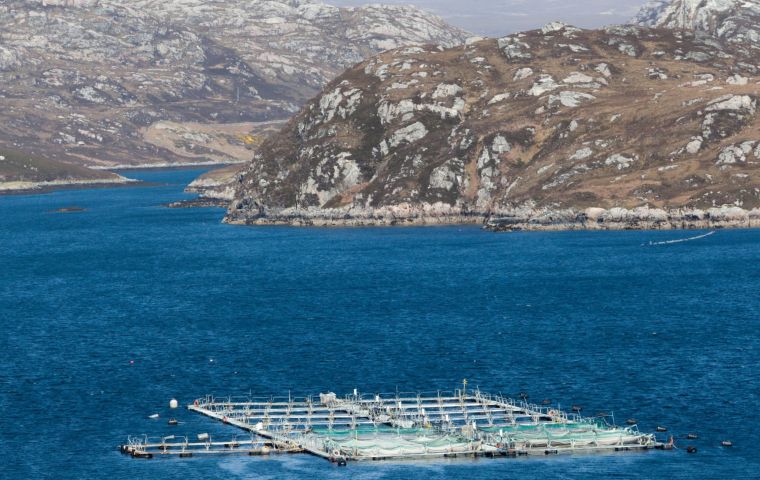MercoPress. South Atlantic News Agency
Scottish salmon producer defends his brand by going after the illegal food trade with forensic science
 Loch Duart has used the technology to launch sting operations on outlets suspected of selling inferior fish, falsely bearing the company's brand.
Loch Duart has used the technology to launch sting operations on outlets suspected of selling inferior fish, falsely bearing the company's brand.  Andy Bing, who co-founded Loch Duart 20 years ago, said: “It's illegal, but people are very rarely caught. We want to change that.”
Andy Bing, who co-founded Loch Duart 20 years ago, said: “It's illegal, but people are very rarely caught. We want to change that.” A high-end Scottish salmon producer is taking on the illegal food fraud trade with forensic science, ahead of a big push into the United States. Loch Duart has used the technology to launch sting operations on outlets suspected of selling inferior fish, falsely bearing the company's brand.
The Sutherland-based firm says it prides itself on farming salmon in an ethical and sustainable way. Food fraud is estimated to cost UK firms up to £12bn a year. The practice of intentionally mislabeling cheap products as premium brands led to the 2013 horsemeat scandal and has also hit the olive oil and coffee industries.
Andy Bing, who co-founded Loch Duart 20 years ago, said: “It's illegal, but people are very rarely caught. We want to change that.”
He told BBC Radio's Good Morning Scotland program: “It normally happens in big cities where you get less scrupulous fish wholesalers who will go to a high-end restaurant, say they've got Loch Duart salmon, but they're selling something from a cheaper provenance and invoicing it as Loch Duart salmon.”
Mr Bing said his company now exported its fish to 20 countries and protecting the brand was vital, given its ethos of farming salmon on a smaller, greener scale, using more expensive fish feed.
Loch Duart teamed up with New Zealand-based firm Oritain, which uses science to find out exactly where products come from.
“Nature gives everything specific markers that is unique to its origin,” said Mr Bing, who has been in the salmon business for 30 years.
“This technology can take trace elements from the loch in which it's farmed. You have a bank of information and you can match our salmon taken from any market in the world to that bank, and work out whether it's ours.”
Mr Bing added: “We've tried to do a couple of stings. We've been led to somewhere by a loyal customer who says, 'I think I've been delivered something which is not the real deal'.
”We've gone down there with our sample bags and tried to apprehend them. We've been doing several checks in the south of England over the last few months. A couple of restaurants refused to give us samples. You can draw your own conclusions from that.“
Mr Bing said the science, which requires 100 grams of uncooked salmon for a test to be carried out, could be used as evidence in a court case. And he said the science could be used across the food and drink industry.
”Next year we're going to make a push into America where our brand's very strong, and we're taking this technology with us,“ said Mr Bing.
He added: ”We're heavily export-orientated, but we've got to get through Brexit. We've got to get the right trade deal, but we believe people want our salmon, they want Scottish whisky and, on a trade level, we'll find a way.”




Top Comments
Disclaimer & comment rulesCommenting for this story is now closed.
If you have a Facebook account, become a fan and comment on our Facebook Page!